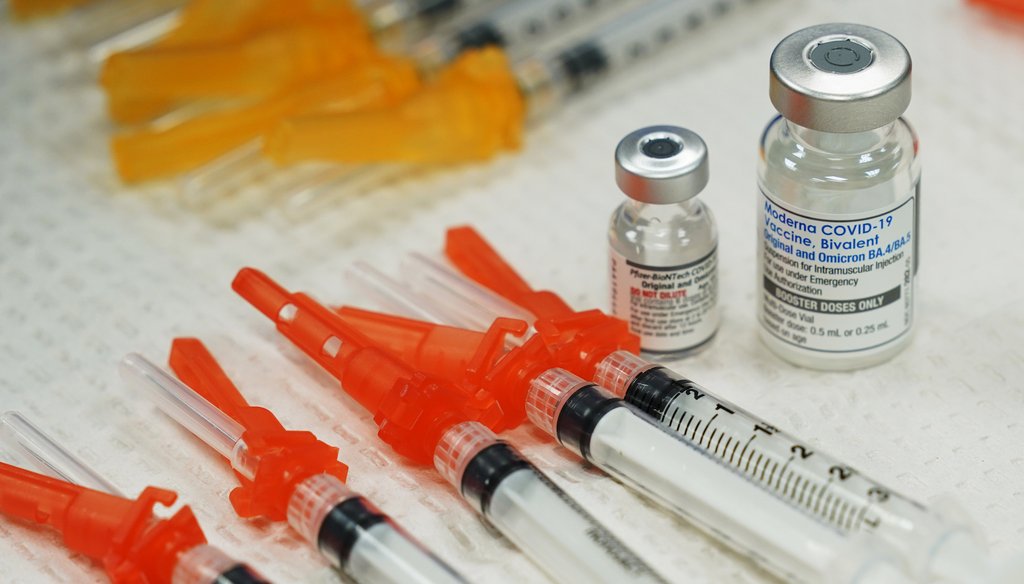Stand up for the facts!
Our only agenda is to publish the truth so you can be an informed participant in democracy.
We need your help.
I would like to contribute

Pfizer, left, and Moderna bivalent COVID-19 vaccines are readied for use at a clinic Nov. 17, 2022, in Richmond. Va. (AP)
If Your Time is short
-
The Food and Drug Administration said April 18 that it was revoking the emergency use authorization for the original, Moderna and Pfizer-BioNTech monovalent COVID-19 vaccines and now recommends people receive the newer, bivalent doses.
-
The bivalent vaccines protect against multiple variants, including the more recent omicron strain. They also work in a single dose rather than the multiple doses needed for the monovalent vaccines.
-
The new guidance was made to simplify the vaccine schedule and encourage future vaccination, the agency said. It is unrelated to safety.
A recent update to the U.S. Food and Drug Administration’s COVID-19 vaccine guidance has caused some confusion.
On April 18, the agency said it was revoking the emergency use authorization for the original Moderna and Pfizer-BioNTech monovalent vaccines to focus on newer, bivalent vaccines.
"Today, FDA amended the (Emergency Use Authorizations) of the Pfizer-BioNTech and Moderna COVID-19 bivalent mRNA vaccines to simplify the vaccination schedule for most individuals," the FDA wrote on Twitter.
The FDA said it was authorizing the use of the current bivalent vaccines (that combat the original and omicron BA.4/BA.5 strains) for all people 6 months of age and older.
"The monovalent Moderna and Pfizer-BioNTech COVID-19 vaccines are no longer authorized for use in the United States," the FDA’s tweet said.
The change quickly resurfaced false claims that the original shots are dangerous.
"FDA quietly banned Moderna & Pfizer," reads text overlaid on a video screenshot that was shared April 21 on Instagram.
"Remember that vaccine they took your job for because you refused, or that party you didn't get invited to, or the holiday you had to cancel, or for all the people that complied & got jabbed under coercion & duress. Well that vaccine is no longer authorized for use by the FDA," read one April 18 tweet that shared a screenshot of the FDA’s announcement.
But these posts don’t detail what changed or why.
The FDA granted emergency use authorization to the monovalent COVID-19 vaccines in late 2020, and full approval in August 2021 and January 2022. The bivalent doses were authorized for emergency use in August 2022.
The FDA didn’t "ban" or revoke the original doses with no replacement, and its decision is unrelated to any safety data. The monovalent vaccines are still licensed, but they are no longer authorized for emergency use in the United States, the agency said.
The newer, bivalent vaccines are designed to work against multiple variants and are delivered in one shot instead of several doses.
The agency now recommends a single dose of the bivalent vaccine for most people — as booster doses or for primary vaccination for people who are unvaccinated.Other people, who are at greater risk for severe COVID-19, may be eligible for additional bivalent vaccine doses.
PolitiFact reached out to the FDA for more details but did not hear back.
In the announcement, Dr. Peter Marks, the FDA’s director of biologics evaluation and research, said that the new guidance aims to simplify the vaccine schedule and encourage future vaccination.
Marks, in a call with reporters April 18, said the original monovalent vaccines would keep their biologics license applications, known as BLAs, and would likely be used for future updates to vaccine composition.
Our Sources
U.S. Food and Drug Administration, Coronavirus (COVID-19) update: FDA authorizes changes to simplify use of bivalent mRNA COVID-19 vaccines, April 18, 2023
Twitter, FDA post, April 18, 2023
Instagram post, April 21, 2023
Twitter post, April 18, 2023
YouTube, MEDIA CALL: Bivalent COVID-19 Vaccines – 4/18/2023, April 18, 2023
U.S. Food and Drug Administration, Emergency use authorization for vaccines explained, Nov. 20, 2020
U.S. Food and Drug Administration, Licensed Products (BLAs), March 29, 2019
U.S. Department of Health and Human Services, COVID-19 Vaccines, accessed April 21, 2023










































